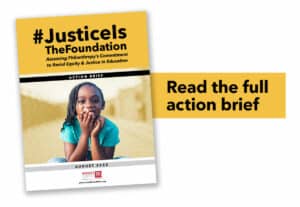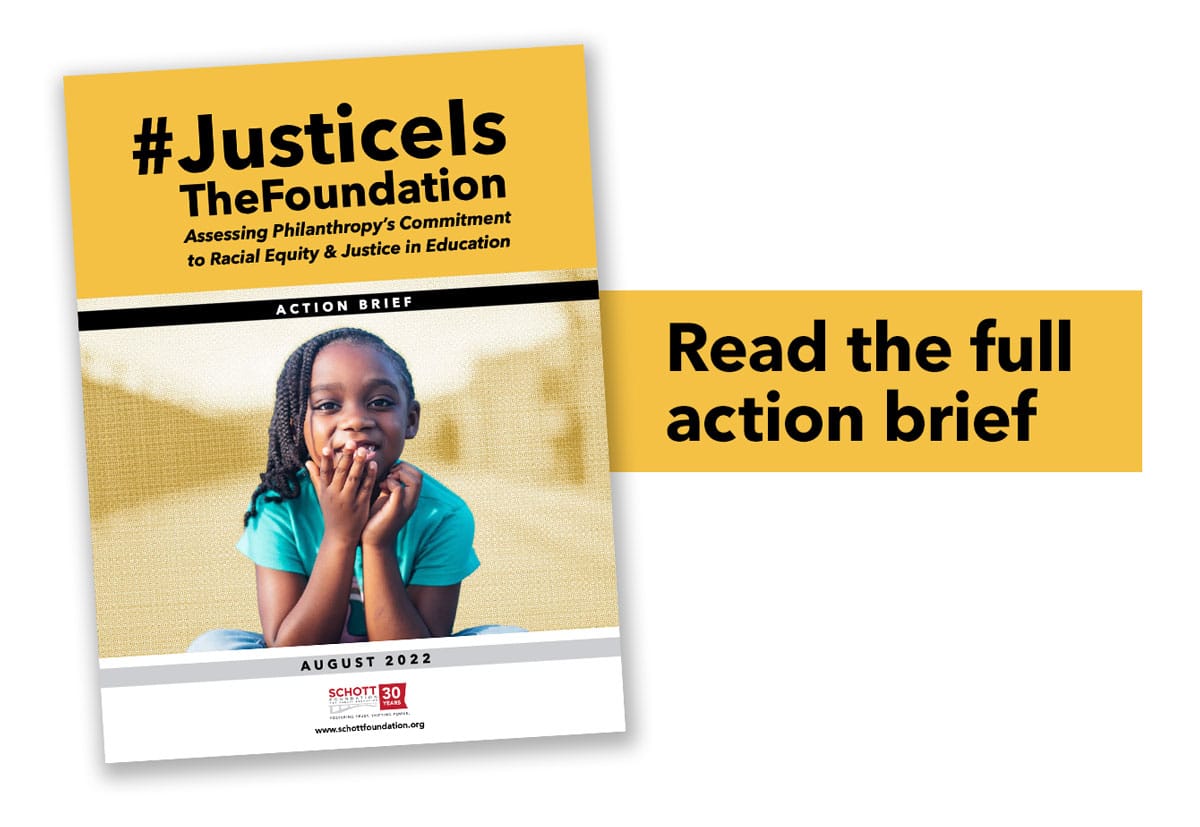News
Inside Philanthropy: Despite the Fanfare, Ed Philanthropy’s Investment in Racial Justice Falls Short

Originally published at Inside Philanthropy.
by Connie Matthiessen
September 06, 2022
The events of 2020 were so raw and eye-opening that they changed the conversation in the world of philanthropy. After the racial reckoning that followed George Floyd’s murder and other incidents of police violence around the country, major philanthropies vowed to prioritize racial equity and justice. Discrepancies in health outcomes, exacerbated by the pandemic, made those commitments even more urgent. Racial justice became a priority for funders, promoting it was a common webinar and Zoom conference topic, and foundation websites prominently displayed statements denouncing structural racism and vowing to center anti-racism in their work.
 These commitments were powerful and heartfelt, and an observer might assume they signaled an imminent future in which funders would channel lots of money toward racial equity and racial justice work.
These commitments were powerful and heartfelt, and an observer might assume they signaled an imminent future in which funders would channel lots of money toward racial equity and racial justice work.
Not so much, it turns out — particularly in the area of education philanthropy.
Recent analysis for a project called #JusticeIsTheFoundation by the Schott Foundation for Public Education and Candid revealed that education philanthropy mostly failed to live up to its stated commitments to racial equity and justice. The new findings build on a 2021 analysis by Schott, also conducted with Candid, which found that racial equity and justice in education are “drastically underfunded.” Over a year later, this is still the case. According to the #JusticeIsTheFoundation project brief, “K-12 education philanthropy has a long way to go to meet the demands of this urgent moment.”
Education philanthropy isn’t alone, of course. Actual philanthropic investments in racial justice haven’t matched many of the grand public pledges from 2020, according to a 2021 joint PolicyLink-Bridgespan report. Inside Philanthropy also recently conducted an in-depth analysis of 11 major racial justice pledges and found that while many funders followed through on funding commitments, overall investments have fallen far short of what is needed. Most of these efforts also fell short when it came to transferring power to communities most affected.
“Only a few funders allowed movement or community leaders to make grantmaking decisions, though some indicated plans to do so in the future. And even though several of the pledges were aimed at catalyzing systemic change, only about a quarter of grants went toward organizations working explicitly on building power in communities of color,” Martha Ramirez and Tate Williams wrote for IP.
The #JusticeIsTheFoundation brief put it this way: “The story the data tells of 2020 is that when it comes to race, too often in philanthropy, we talk the talk, but we’re less likely to finish the race.”
Still drastically underfunded
As an education foundation, Schott worked with Candid to zero in on that part of the philanthropic sector for #JusticeIsTheFoundation. Among the project’s key findings were the following:
-
Overall, K-12 grantmaking peaked in 2018 and has declined ever since.
-
Education philanthropy drastically underfunds both racial equity and racial justice, even as deep achievement and opportunity gaps highlight student need.
-
As an indicator of this drastic underfunding, racial justice work comprises less than 1% of K-12 education grantmaking.
-
Grantmaking for racial equity and racial justice in education decreased slightly in 2020, despite funders’ stated commitments.
For Diallo Brooks, senior vice president of programs and advocacy at the Schott Foundation, the findings weren’t a surprise. “We anecdotally felt that this was the reality,” he said. “But to see the actual data behind it was eye-opening, and really gives us a space where we need to lean in and do more.”
Brooks doesn’t think the shortfall in support signals a lack of will or good intentions, and he emphasized that the point of the project is not to shame and blame education funders. Instead, Schott’s goal is to raise awareness and offer practical steps funders can take to live up to their racial equity and justice commitments.
“It goes beyond thinking about the issues or even moving some money,” Brooks said. “It’s about, are we bringing in the right stakeholders? Are we having the right conversations? Are we removing internal barriers that stand in the way of us really achieving what we’re setting out to achieve? Folks have to have the right structures and the right ideas and the right people at the table to help move that forward.”
Action items
Brooks acknowledges that this kind of change can be difficult, since it requires a fundamental shift in the way foundations are used to operating. “Part of it really is stepping out of your comfort zones and the relationships you’ve built over long periods of time,” he said. “It means stepping out of those traditional relationships and building new relationships with people and organizations you may not be familiar with.”
The #JusticeIsTheFoundation project provides a long list of concrete “action steps” that can help funders leave their comfort zones. The steps include specific changes in foundation practices as well as resources funders can use to educate themselves about racial justice and racial equity. For example, funders are encouraged to hire and empower staff members with experience in grassroots communities, to engage in trust-based philanthropy, and to regularly evaluate grantmaking strategies and encourage feedback from grantees “to ensure your actions are lining up with your new commitments.” (See the complete list of action steps here.)
Schott is eager to help foundations make these changes. One of the action steps urges funders to engage with education justice intermediaries like Schott, Communities for Just Schools Fund and Blue Meridian. The three organizations all work closely with grassroots groups that are doing racial justice work in local communities.
Brooks describes Schott as a bridge. “We have relationships in philanthropy, but we also have relationships with grassroots organizations,” he said. “Our mission is to help bridge that gap and to move those resources to the folks that have the answers to the problems on the ground.”
The urgency of now
Support for racial equity and racial justice in education is always important, and it is particularly critical right now, as schools have become a front in the culture wars. Attacks on so-called “critical race theory,” book bans, and legislation restricting the information teachers can provide their students are on the rise around the country.
A new report by PEN America found that the number of proposed “educational gag orders’’ — efforts by state legislators to restrict teaching about topics including race, gender, American history and LGBTQ+ identities — has increased by a whopping 250% compared to last year.
School by school, around the country, efforts to silence teachers are having an impact. One in four teachers have been instructed to limit discussions of political or social issues, according to a national survey conducted by the Rand Corporation. At one Pennsylvania school, parents complained about a teacher’s social studies curriculum. “I was accused of teaching critical race theory when I taught about how the Civil War was fought over racism and slavery,” Jake Miller told NPR. The incident was one of the reasons Miller decided to quit teaching. In Michigan, parents protested when a teacher assigned a young adult book on antiracism in her social studies class, and the school district received Freedom of Information Act requests for her classroom materials. The teacher won’t be assigning the book this year.
Even in deep-blue California, a fledgling parents’ rights movement with similar aims is working to gain influence on local school boards, according to the San Francisco Chronicle. In April, the Placentia Yorba-Linda Unified School Board voted three to two to ban critical race theory, and similar efforts are underway in school districts around the state.
Through its Invest Together Fund, Schott has helped support local groups working to counter such efforts, as IP has reported, but the funding remains lopsided — deep-pocketed conservative funders are pouring plenty of money into anti-CRT campaigns. Diallo Brooks says the grassroots groups Schott works with do a tremendous job with few resources, but additional funding could empower them to do much more.
When #JusticeIsTheFoundation was announced, Brooks said, “A rising tide of Black, brown and Indigenous community organizing has brought more inclusive and historically accurate education to public school students in districts and states across the country. Their impressive advances are now under attack by those seeking to stoke racial division and advance political agendas. We invite education philanthropy to join us in investing in racial justice, because true equity requires justice.”



